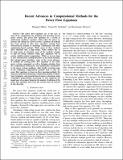Recent advances in computational methods for the power flow equations
Author(s)
Mehta, Dhagash; Molzahn, Daniel K.; Turitsyn, Konstantin
DownloadRecent advances.pdf (372.2Kb)
OPEN_ACCESS_POLICY
Open Access Policy
Creative Commons Attribution-Noncommercial-Share Alike
Terms of use
Metadata
Show full item recordAbstract
The power flow equations are at the core of most of the computations for designing and operating electric grids. This system of multivariate nonlinear equations relate the power injections and voltages in an electric power system. A plethora of methods have been devised to solve these equations, from Newton-based methods to homotopy continuation and other optimization-based methods. Although many of these methods often efficiently find a high-voltage, stable solution, challenges remain for finding low-voltage solutions, which play significant roles in certain stability-related computations. While we do not claim to have exhausted the existing literature on all related methods, this tutorial paper introduces some of the recent advances in power flow solution methods to the wider power systems community as well as bringing attention from the computational mathematics and optimization communities to power systems problems. After briefly reviewing some of the traditional computational methods used to solve the power flow equations, we focus on three emerging methods: the numerical polynomial homotopy continuation method, Gröbner basis techniques, and moment/sum-of-squares relaxations using semidefinite programming. In passing, we also emphasize the importance of an upper bound on the number of solutions of the power flow equations and review the current status of research in this direction.
Date issued
2016-08Department
Massachusetts Institute of Technology. Department of Mechanical EngineeringJournal
Proceedings of the 2016 American Control Conference (ACC)
Publisher
Institute of Electrical and Electronics Engineers (IEEE)
Citation
Mehta, Dhagash, Daniel K. Molzahn, and Konstantin Turitsyn. “Recent Advances in Computational Methods for the Power Flow Equations.” 2016 American Control Conference, 6-9 July 2016, Boston, MA, USA, IEEE, 2016.
Version: Original manuscript
ISBN
978-1-4673-8682-1